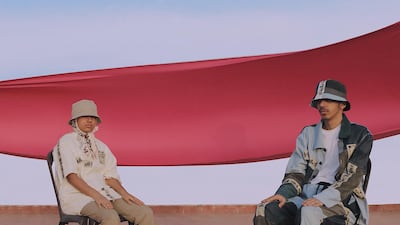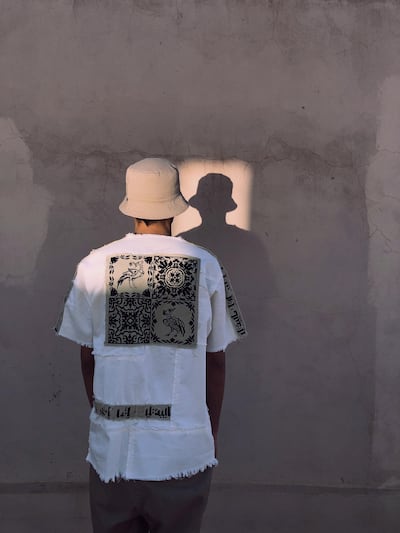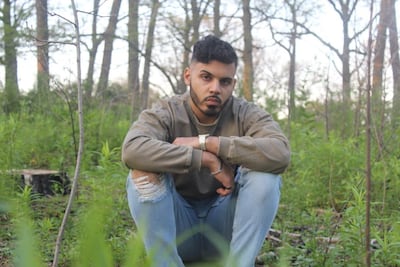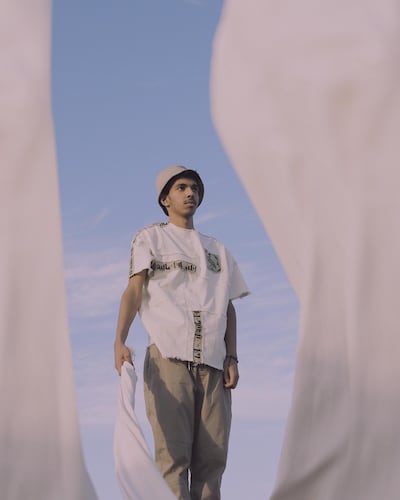Taha Yousef fuses poetry of the Middle East with Western streetwear – a fitting way of paying homage to his heritage, given he was brought up in Sharjah and now calls Toronto home.
“I was born in the UAE," explains Yousef, founder of streetwear brand LoveClosely, via Zoom from Canada. "My childhood was there, I went to school there and moved to Toronto when I was a teenager. It really stayed with me, and having gone through things like 9/11, that always stuck with me that this is how the West perceived us.”
And now, Yousef is keen to cement his connection with the Mena region once again, by bringing his clothing brand to his birthplace.
Growing up in what he describes as the "melting pot" of Toronto, he realised that many around him had only a negative view of the Middle East, with little or no idea about the rich cultural heritage. Eager to redress that, he set about creating his own clothing brand that would meld the two.
“I got into fashion to use it as medium to showcase the beauty that exists in the Middle East and South Asia. It is not appreciated for its art forms, for its history, or the beauty of the Arabic language."
Leaning on Arabic poetry, Yousef began to weave phrases and imagery through his designs, creating street wear staples such as over-sized track suits, with Arabic wording running down the side seam, and baseball shirts with "The Sun rises in the East" emblazoned across the back, in dual languages.
“I wanted to really make it simple for those who may not have been exposed that that culture, and make them able to relate to it, I want to bridge that gap that exists for some people.”
The result was LoveClosely, launched in late 2018, which soon grew a loyal following, including musicians such as Jessie Reyez, Riz Ahmed, Roy Woods, Yuna, Ali Gatie, Drake’s producer OVO 40, and French Montana.
Now, several North American pop-ups later, the brand is now keen to bring its latest collection, entitled Birds of Love, back to the Mena region (including a website showing prices in AED) and launch the latest offering online during the week of Monday, 27 July.

True to form, the new collection has taken its inspiration from a poem by Attar of Nishapur called Conference of the Birds, that was written in 1177 and is widely regarded as a masterpiece of Persian literature. From its soaring allegories about the fruitless search for happiness that can only be found within, Yousef has taken a bird motif to scatter throughout the collection. As a message, despite being over eight hundred years old, Yousef feels the poem is now more pertinent than ever.
“In a post-pandemic world, a lot of people have been forced away from their nine to five lives, of always being busy and always having something to do. Now we have been put in a position where we have to question the choices we are making, and I wanted to take this very historic piece of poetry and take the message from it and present in a way that it will resonate now."
LoveClosely is also attempting to capture the cultural zeitgeist by shifting away from using higher end fabrics such as satin, and moving towards upcycled fabric off-cuts instead. With the new collection patch-worked from left overs of different types of material, with seams all left frayed, the result is a deeply urbane aesthetic with a focus on environmental responsibility.
“Switching over to something sustainable is something we wanted to do all along. We are carrying such a meaningful message in our clothing, we also want where that clothing comes from to be meaningful. It took quite a bit a bit of time to really source waste materials, and everything is a little different from each other as a result, and its exciting. It’s a tricky time but I think the door has opened for smaller brands, because I think people are looking for smaller brands they identify with."
To further build the link with the region, the accompanying campaign images for the new collection were shot by in Marrakech by Moroccan artist Ismail Zaidy, who is known for his raw takes on Arabic identity. For Yousef, having an Arabic artist involved was important, almost as important as bringing the Arabic inspired clothing back to the Middle East.
"Our culture is very beautiful in itself, and there should be a lot of pride in who we are. We can show people that this is being accepted at an international level by people who are not necessarily Arab, and [we can] take pride in it.
“I hope we can take what we have accomplished here and take it back to the Middle East and show people it’s being appreciated in North America.”




